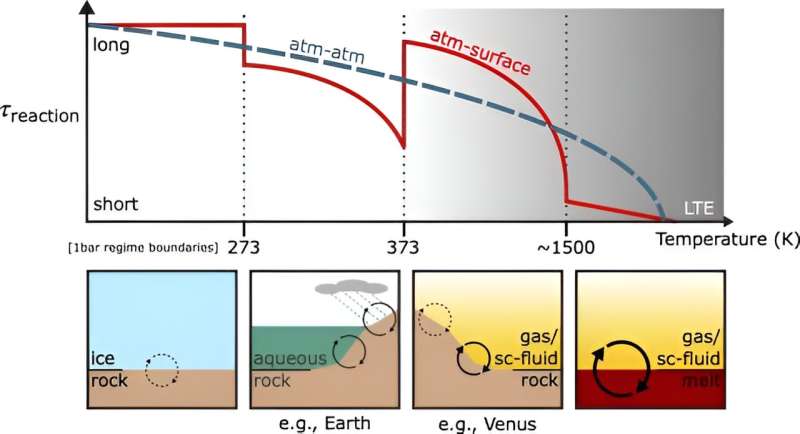
As astronomers have begun to gather data on the atmospheres of planets, we’re learning about their compositions and evolution. Thick atmospheres are the easiest to study, but these same thick atmospheres can hide the surface of a planet from view. A Venus-like world, for example, has such a thick atmosphere making it impossible to see the planet’s terrain. It seems the more likely we are to understand a planet’s atmosphere, the less likely we are to understand its surface. But that could change thanks to a new study accepted for publication in the Monthly Notices of the Royal Astrophysical Society and available on the arXiv preprint server.
Rocky worlds have a rich chemical exchange between their surfaces and their atmospheres. On Earth, the cycles of rain and evaporation, seasons of growth and harvest, and volcanic activities change the atmospheric composition over time. These exchanges happen over a long timescale, so Earth’s surface and atmosphere are never in a state of mutual equilibrium. On Venus, with its thicker atmosphere and dry surface, the timescale of exchange is shorter, but still not fast enough to reach a balance.
In this study, the authors argue that for warm Venus-like worlds with particularly thick atmospheres, a chemical equilibrium between surface and air can be reached. These worlds are the kind we find closely orbiting small stars, so they are well-suited for atmospheric studies.
To show how this works, the team simulated chemical interactions right at the interface between the atmosphere and the rocky surface. Their simulations showed that chemical equilibrium for simple molecules such as carbon dioxide the atmosphere of Venus can be used to probe the composition of its surface, and depending on surface temperature, Venus-like exoplanets could see strong interactions for more complex molecules CaAl2Si2O8 and MgAl2O4.

In other words, under the right circumstances, small rocky worlds closely orbiting their warm star are excellent candidates for this kind of study. What we learn about their atmospheres can open a window on the composition of their surface, and even their geological activity. We could even determine whether certain minerals are present or absent on the surface of an exoplanet, without ever viewing its surface directly.
This kind of information is vital to our understanding of how terrestrial planets form. Previous studies have already shown that our solar system is rather unusual and that a solar system free of large planets in the inner solar system is rare. By understanding the evolution and composition of the inner planets of other stars, we will learn why our solar system is unusual, and perhaps even learn if life such as ours is common or rare in the universe.
More information:
Xander Byrne et al, Atmospheres as a Window to Rocky Exoplanet Surfaces, arXiv (2023). DOI: 10.48550/arxiv.2312.11133
Citation:
The atmosphere of an exoplanet reveals secrets about its surface (2023, December 27)
retrieved 28 December 2023
from https://phys.org/news/2023-12-atmosphere-exoplanet-reveals-secrets-surface.html
This document is subject to copyright. Apart from any fair dealing for the purpose of private study or research, no
part may be reproduced without the written permission. The content is provided for information purposes only.

